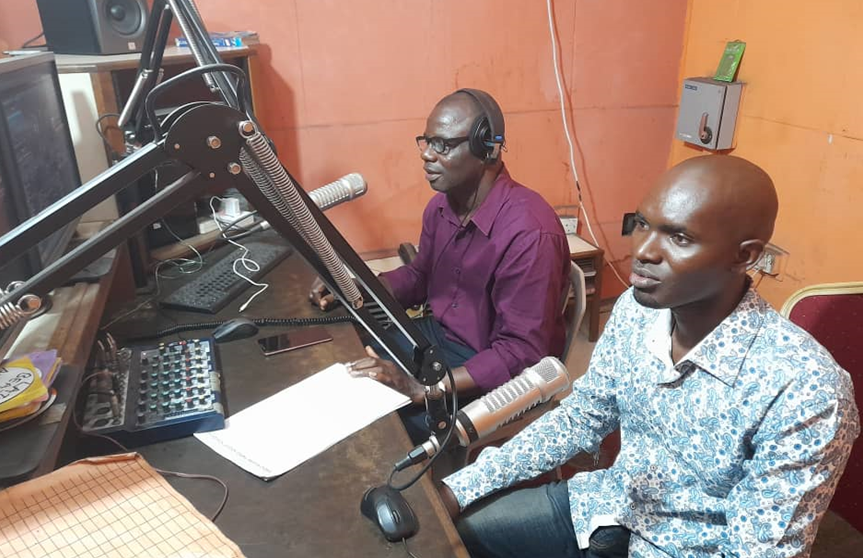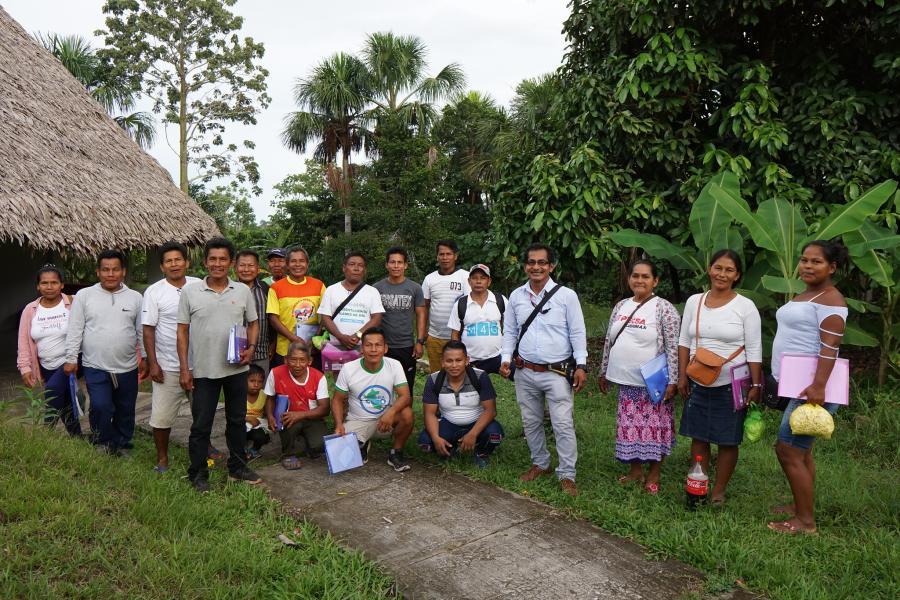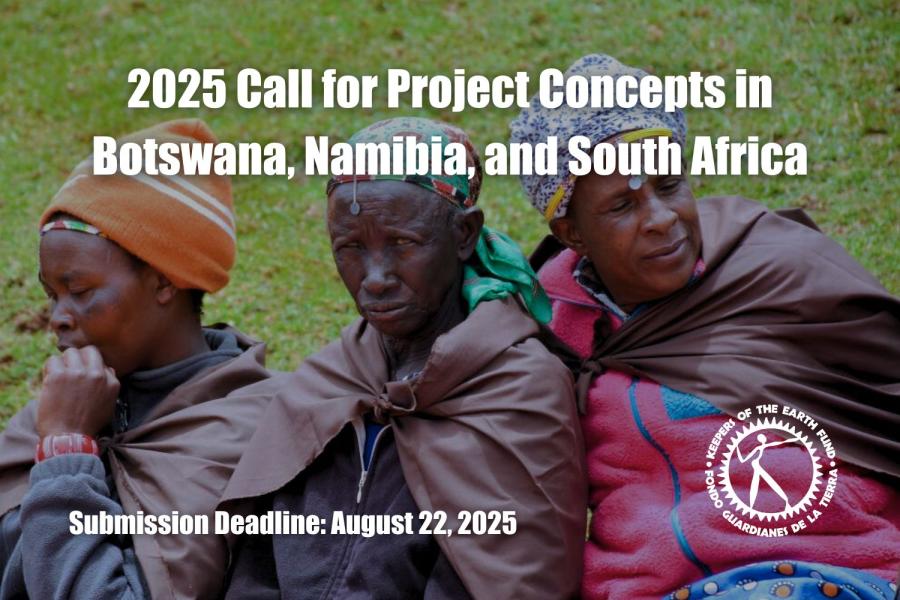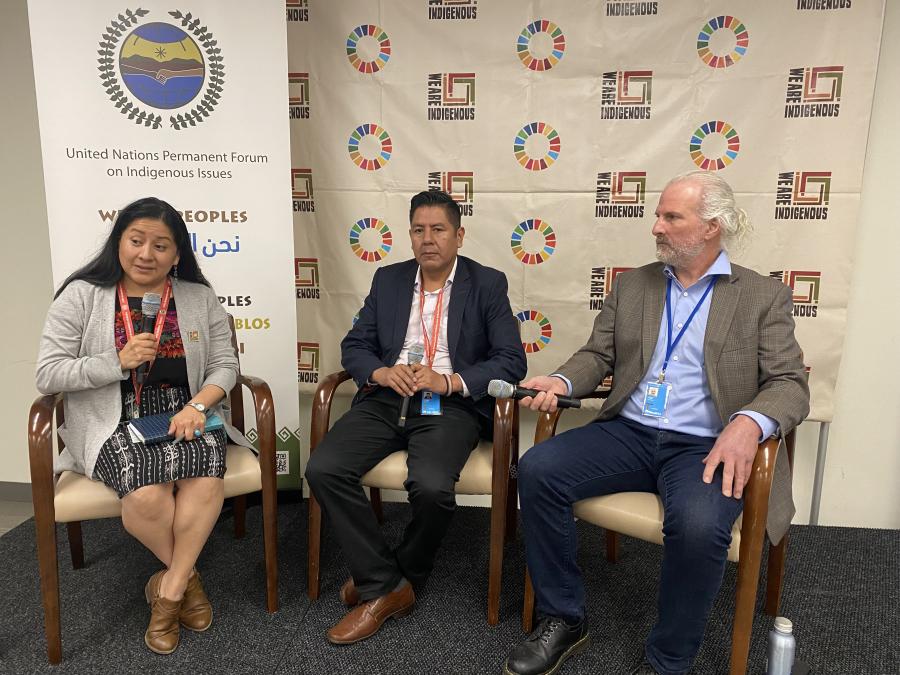
Working towards an equitable recovery from the COVID-19 pandemic, Cultural Survival supports Indigenous communities who are organizing and taking action locally for the well being of their members. This includes Indigenous community radio stations that are lifelines in rural communities where the internet is not accessible. In lieu of crises like climate change and the pandemic, Indigenous radio stations remain strong and continue to build trust within communities to uplift their struggles and voices. Community radio is a tool to spotlight local stories, essential information, knowledge, and solutions, especially during times of emergency.
Cultural Survival recognizes and supports Indigenous community radio stations that inform and support their communities in their own languages with culturally relevant information to prevent the spread of COVID-19. Since the start of the pandemic, our Indigenous Rights Radio has produced over 740 programs in over 150 Indigenous languages in response to COVID-19. In recent months, Cultural Survival has been supporting communities in Mexico, Nigeria, India, and the United States.
However, Indigenous communities are facing new challenges since the pandemic. While many community radio stations continue their responsibilities of disseminating information, Indigenous journalists, communicators, and broadcasters face risks of criminalization for their work. They also play a critical role in mitigating and stopping the spread of misinformation about COVID-19 in their communities. Despite these challenges, Indigenous community radio stations have proven essential due to their community-based, Indigenous character and coverage in Indigenous languages, particularly in remote rural areas that are not served by mainstream media.
Thanks to a grant from MacArthur Foundation’s Equitable Recovery Initiative, in 2021 and early 2022, Cultural Survival supported 40+ Indigenous artists and distributed 15 grants totaling $78,000 through our Indigenous Community Media Fund to 15 Indigenous community radio stations across Mexico, Nigeria, India, and the United States. Cultural Survival's grants funded infrastructure needs, broadband internet access, training, audiovisual production, and the sustainability of the communication processes of community radio stations to respond to Indigenous Peoples’ need for information on COVID-19.
Meet our radio grant partners:
Xaltoja Radio (Nahua), Mexico
Xaltoja Radio assists local communities in strengthening and promoting their culture and exercising community autonomy. They seek to respond to the problem of misinformation about COVID-19 impacting Indigenous Peoples in Jaltocán and surrounding areas by carrying out trainings in audio recording, production, and editing to enable the production of a radio series about COVID-19 survivors; bilingual programs on medicinal plants and traditional food recipes; musical compositions on health recommendations; and radio programs on alternative medicine. They will also organize workshops focused on the operation and maintenance of transmitters, management of platforms and social networks, and on administrative and organizational issues.
Namakasia Radio (Yaqui), Mexico
Namakasia Radio is a radio station by and for the Yaqui Peoples. It is made up of a committed team who works to promote Yaqui culture and identity in all its historical and current aspects. With grant funds, the station seeks to strengthen its presence and coverage in local communities through strengthening its digital and print magazines and its community TV channel, and by building technical capacity in equipment repair, operation, writing, locution, and investigative reporting. The project will contribute to promoting Yaqui voices, language, and culture.
Cuixtleña Radio (Zapotec), Mexico
Radio Cuixtleña is a community radio station that broadcasts from the Sierra Sur of the State of Oaxaca in Santa Catarina Cuixtla, Miahuatlán. Its programming aims to be in service to the public with a cultural, educational, and entertainment focus. In response to the challenges that Zapotec communities have experienced as a result of the pandemic, Radio Cuixtleña aims to assess the implications of pandemic-related isolation and offer guidance to the communities who tune into the station. With grant funds, Radio Cuixtleña will produce 10 radio reports. Each report will address a problem affecting the community during the pandemic, and experts will be invited to offer advice and possible solutions. The station will also organize workshops in radio journalism on topics such as gender, script writing, and radio production.
Radio Tachi Ñuu Itía Ta’nu (Mixteco), Mexico
Radio Tachi Ñuu Itía Ta´nu is a volunteer-run community radio station focused on promoting the music and customs of Tu'un Savi language speakers. During the COVID-19 pandemic, they have informed Indigenous communities about measures to prevent the spread of the virus through radio spots and radio content from local governments and federal authorities. With grant funds, the station will continue to inform Indigenous communities about prevention and the new variants of COVID-19. They will also produce radio programs in the Tu'un Savi language and special programs in alliance with local educational and health authorities.
African Indigenous Foundation for Energy and Sustainable Development (Ogoni), Nigeria
African Indigenous Foundation for Energy and Sustainable Development’s mission is to build peace, eliminate injustice through non-violent means, and promote the achievement of the Sustainable Development Goals in Ogoniland. In partnership with Treasure Radio, AIFES seeks to raise awareness among the population about biosafety protocols and the importance of getting vaccinated to prevent severe illness from COVID-19. In addition, their initiative seeks to influence the government to make vaccines available to all sectors of the community, particularly in local health centers. They will produce radio announcements, radio shows, and ringtones in collaboration with telephone service providers about content related to the pandemic.
The Bori Chronicle (Ogoni), Nigeria
The Bori Chronicle is a community media organization working mainly in print media through a fortnightly print publication that focuses on the realities and needs of Ogoni communities. This publication is widely circulated in Indigenous communities in the Niger Delta region. With grant funds, Bori Chronicle seeks to prevent and minimize the spread of COVID-19 by creating content that raises awareness and provides necessary, accurate, and culturally appropriate information. They plan to increase the production and strategic distribution of their newspaper, build alliances with other print media, publish editorials and opinion pieces, and organize press conferences and advocacy meetings with educational authorities.
Weekly Watch (Ogoni), Nigeria
The Weekly Watch is a media house that disseminates information about the realities of the Ogoni Peoples and other nationalities in the Niger Delta region. Among the main problems faced by the Ogoni People during this pandemic are poor hygiene and sanitation, misinformation, and lack of trust in the government. With grant funds, Weekly Watch seeks to raise awareness of the Ogoni Peoples about COVID-19 and vaccines. Weekly Watch will launch an education and awareness campaign that will disseminate content in text messages, social media, and other media; organize visits to local communities to play information about COVID-19 on loudspeakers; and distribute reports about COVID-19 in local languages.
Adivasi Lives Matter (Adivasi), India
Adivasi Lives Matter is a platform launched in 2016 to amplify the voices of Adivasi and Indigenous Peoples in India. For the past two years, Prayog's Adivasi Awaaz project has enabled more than 150 young Adivasis from 3 states to document and share their stories through digital journalism and films using mobile phone technology. The pandemic put a halt to their project as they pivoted to address the needs of the communities caused by the loss of livelihoods. With grant funds, Adivasi Lives Matter will resume to provide training, mentoring, and editorial support opportunities to young Adivasi people who are content creators. Their workshops will focus on social media management, creating platforms for telling stories and designing publications for digital distribution, and strengthening young people's knowledge on the use of their mobile phones to create photo and video content.
Asur Adivasi Mobile Radio (Adivasi), India
Asur Adivasi Mobile Radio is an Indigenous and Adivasi-led community organization. Their mission is to revitalize Adivasi languages, cultures, and traditional knowledge and to strengthen Indigenous self-governance and constitutional rights. Asur Adivasi Mobile Radio has alliances with 32 Indigenous and Adivasi communities of Jharkhand, India, but their community organizing was diminished as a result of the COVID-19 pandemic. With grant funds, they hope to create awareness in the community to organize for their linguistic, cultural, and ancestral rights of self-government, and to influence the government, NGOs, and the media to support initiatives to revive and strengthen endangered Adivasi languages such as Asur.
Citizen Radio (Meitei), India
Citizen Radio is an independent media outlet and internet radio station operating in Manipur, India, whose goal is to strengthen democracy, respect human rights, and promote the right to freedom of opinion and expression. With grant funds, Citizen Radio will launch an awareness and information campaign on the main social, political, and economic problems that women, youth, and Indigenous communities have faced during the pandemic. This initiative is expected to influence decision-makers and raise public awareness about biosafety protocols and vaccines to prevent the spread of the coronavirus.
Kat News Channel (Karbi), India
Kat News Channel is the first local cable television station in Karbi Anglong. It was launched on September 17, 2016, with the aim of promoting and fighting for the advancement of the local culture and highlighting socio-economic problems and the most relevant problems of the population. During the pandemic, Kat News Channel has distributed information about COVID-19 in local languages to outlying regions where many Indigenous Peoples live. With grant funds, they will continue these actions of raising awareness and information sharing for Indigenous populations in six local languages. They will conduct visits to Karbi and other Indigenous communities and produce a special television program and educational materials related to COVID-19.
Rumbul (Mundari), India
Rumbul, which means “echo” in Mundari, is a team dedicated to the protection and promotion of their language, culture, and traditions. They currently have a YouTube channel called “Abua Disum,” where they create and post videos related to cultural and constitutional rights and important events to Indigenous Peoples. During the pandemic, they have contributed to disseminating information on COVID-19 prevention measures aimed at remote Indigenous communities as well as the general population. With grant funds, they seek to produce scientific content in Indigenous languages related to COVID-19 and vaccines, traditional medicinal practices to mitigate the spread and severity of the virus, and Indigenous worldviews about nature. They will hold community meetings, conduct interviews with traditional authorities and bearers of tradition as well as doctors from Indigenous communities, and distribute informational material in Indigenous languages.
KWL Radio Station (Hualapi), United States
KWL Radio is a program of the Hualapai Tribe's Department of Health, Education and Welfare that promotes the traditions, culture, and language of the Hualapai Tribe. The goal of the project is to support community members, especially Hualapai language speakers, to become better informed about COVID-19 and available local resources. KWL Radio will translate public service announcements and promotional announcements of events into Hualapai while partnering and collaborating with Tribal departments and programs to ensure that content related to COVID-19 is culturally appropriate and translated. They will also purchase portable recording equipment to obtain quality recordings of translation services for community elders.
Rez Flower Media (Navajo/Hopi), United States
Rez Flower Media promotes, educates, and strengthens Indigenous voices in media. Tribal Community Radio was created by long-time Tribal radio volunteers with the idea that media is available to everyone, and that once an individual is trained, supported, and given the chance to share their voice, they become a powerful asset to their community. Their project is titled, "When We Speak, People Listen: Indigenous Radio News Training Project,” and has the goal to strengthen Native American Tribal radio station newsrooms in the United States by creating an online training program for learning the basics of creating local news from their respective communities for Tribal radio airwaves. Through this project, Rez Flower Media will partner with five Tribal radio stations and will train 10 Indigenous participants in basic radio news journalism. Participants will create five radio news spots for their local radio station and be confident to continue to create news spots when responding to COVID-19 and other local needs in their communities.
Mixteco Indigena Community Organizing Project (Mixteco), United States
Mixteco Indígena Community Organizing Project is the only organization dedicated to addressing the unique needs of Indigenous immigrants in California's central coast region, serving Mixteca people from southern Mexico. This area is home to many Indigenous populations, in particular Mixtec, Zapotec, and Triqui Peoples, with more than 125 Indigenous languages spoken in the region. During the pandemic, MICOP has been the only organization in its region to provide information on COVID-19 in Mixteco, Purepecha, Zapotec, and Triqui languages. With the project, they seek to continue raising awareness and informing Indigenous populations in the central coast through public service announcements about the Omicron variant and live programming with experts from local public health departments, mainly about COVID-19 tests and vaccines.



